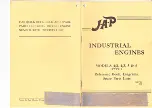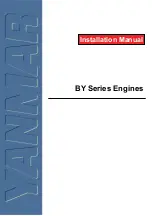
ENGLISH
7
SAFETY PRECAUTIONS
• Make sure the engine is off before you begin any maintenance
or repairs. To prevent accidental startup, disconnect the spark
plug cap. This will eliminate several potential hazards:
–
Carbon monoxide poisoning from engine exhaust.
Operate outside, away from open windows or doors.
–
Burns from hot parts.
Let the engine and exhaust system cool before touching.
–
Injury from moving parts.
Do not run the engine unless instructed to do so.
• Read the instructions before you begin, and make sure you
have the tools and skills required.
• To reduce the possibility of fire or explosion, be careful when
working around gasoline. Use only a non-flammable solvent,
not gasoline, to clean parts. Keep cigarettes, sparks and flames
away from all fuel related parts.
Remember that an authorized Honda servicing dealer knows your
engine best and is fully equipped to maintain and repair it.
To ensure the best quality and reliability, use only new Honda
Genuine parts or their equivalents for repair and replacement.
MAINTENANCE SCHEDULE
*
Replace the paper filter element only.
(1) For commercial use, log hours of operation to determine
proper maintenance intervals.
(2) Service more frequently when used in dusty areas.
(3) If there are deposits of grass, trash, or other debris, clean regularly.
(4) These items should be serviced by your servicing dealer,
unless you have the proper tools and are mechanically
proficient. Refer to the Honda shop manual for service
procedures.
(5) In Europe and other countries where the machinery directive
2006/42/EC is enforced, this service should be done by your
servicing dealer.
Failure to follow this maintenance schedule could result in
non-warrantable failures.
REGULAR SERVICE PERIOD (1)
Perform at every
indicated month or
operating hour interval,
whichever comes first.
ITEM
Each
Use
First
Month
or
20 Hrs
Every 6
Months
or
100 Hrs
Every
Year
or
300 Hrs
Every 2
Years
or
500 Hrs
Refer
to
Page
Engine oil
Check level
o
Change
o
o
Engine oil filter
Replace
Every 200 Hrs. (4)
—
Air cleaner
Check
o
Clean
o (2)
Replace
o *
Oil cooler
(applicable types)
Check
o (3)
—
Spark plug
Check-adjust
o
Replace
o
Spark arrester
(applicable types)
Clean
o (5)
Valve clearance
Check-adjust
o (4)
—
Combustion
chamber
Clean
After every 1000 Hrs. (4)
—
Fuel filter
Replace
o (4)
—
Fuel tube
Check
Every 2 years
(Replace if necessary) (4)
—
REFUELING
Recommended Fuel
This engine is certified to operate on unleaded gasoline with a
pump octane rating of 86 or higher (a research octane rating of
91 or higher).
Refuel in a well ventilated area with the engine stopped. If the
engine has been running, allow it to cool first. Never refuel the
engine inside a building where gasoline fumes may reach flames
or sparks.
You may use unleaded gasoline containing no more than 10%
ethanol (E10) or 5% methanol by volume. In addition, methanol
must contain cosolvents and corrosion inhibitors. Use of fuels
with content of ethanol or methanol greater than shown above
may cause starting and/or performance problems. It may also
damage metal, rubber, and plastic parts of the fuel system.
Engine damage or performance problems that result from using a
fuel with percentages of ethanol or methanol greater than shown
above are not covered under the Warranty.
If your equipment will be used on an infrequent or intermittent
basis, please refer to the fuel section of the STORING YOUR
ENGINE chapter (see page 11) for additional information
regarding fuel deterioration.
Fuel can damage paint and some types of plastic. Be careful not
to spill fuel when filling your fuel tank. Damage caused by spilled
fuel is not covered under the Distributor’s Limited Warranty
.
Never use gasoline that is stale, contaminated, or mixed with oil.
Avoid getting dirt or water in the fuel tank.
With the engine stopped and on a level surface, remove the fuel filler
cap and check the fuel level. Refill the tank if the fuel level is low.
Refer to the instructions provided with the equipment powered
by this engine for refueling.
Refuel in a well-ventilated area before starting the engine. If the
engine has been running, allow it to cool. Refuel carefully to
avoid spilling fuel. It may be necessary to lower the fuel level
depending on operating conditions. After refueling, tighten the
fuel tank cap securely.
Keep gasoline away from appliance pilot lights, barbecues,
electric appliances, power tools, etc.
Spilled fuel is not only a fire hazard, it causes environmental
damage. Wipe up spills immediately.
Unleaded gasoline
U.S.
Pump octane rating 86 or higher
Except U.S.
Research octane rating 91 or higher
Pump octane rating 86 or higher
Gasoline is highly flammable and explosive.
You can be burned or seriously injured when handling fuel.
• Stop the engine and let it cool before handling fuel.
• Keep heat, sparks, and flame away.
• Handle fuel only outdoors.
• Keep away from your vehicle.
• Wipe up spills immediately.
37ZEA6010.fm Page 7 Tuesday, June 25, 2019 10:45 AM
Summary of Contents for iGX700
Page 19: ...ENGLISH 19 MEMO 37ZEA6010 fm Page 19 Tuesday June 25 2019 10 45 AM ...
Page 20: ...37ZEA6010 fm Page 20 Tuesday June 25 2019 10 45 AM ...
Page 39: ...FRANÇAIS 19 NOTES 33ZEA6010 fm Page 19 Tuesday June 25 2019 11 02 AM ...
Page 40: ...33ZEA6010 fm Page 20 Tuesday June 25 2019 11 02 AM ...
Page 59: ...ESPAÑOL 19 NOTA 35ZEA6010 fm Page 19 Tuesday June 25 2019 11 44 AM ...
Page 60: ...35ZEA6010 fm Page 20 Tuesday June 25 2019 11 44 AM ...








































